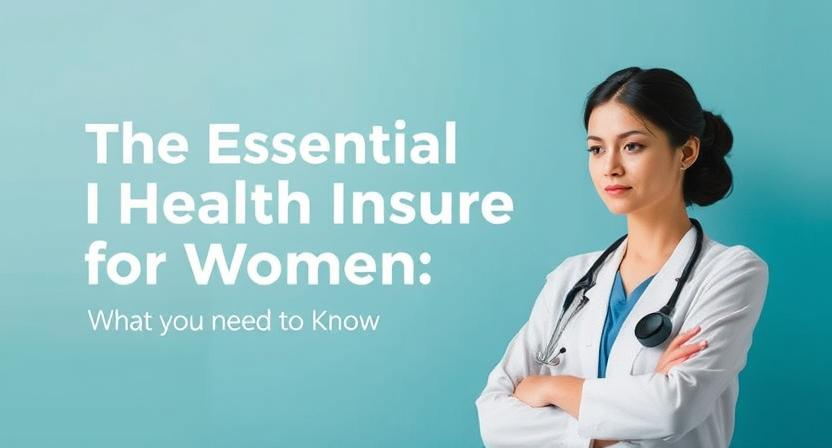Health insurance is essential for everyone, but for women, it’s especially important because of the unique health needs that arise throughout different stages of life. From reproductive health to maternity care, mental health support, and preventive services, women’s health insurance needs are diverse. Unfortunately, many women overlook or don’t fully understand the extent of coverage available to them.
This guide is designed to help you navigate the world of health insurance, specifically tailored to the needs of women. We’ll break down key considerations, essential coverages, and tips on selecting the right health insurance plan to ensure that you have the protection you deserve.
1. Understanding the Importance of Health Insurance for Women
Health insurance plays a critical role in protecting your financial well-being and access to healthcare services. For women, health insurance is not just about visiting the doctor or managing chronic conditions; it also covers critical aspects of reproductive health, maternity care, and preventive services, such as screenings for breast cancer or cervical health.
Health insurance also helps ensure that women can manage healthcare costs in the event of unexpected health issues. Without insurance, the cost of care for something as common as childbirth can be unaffordable for many families. Health insurance is not just a luxury; it’s a necessity to maintain both short-term and long-term health.
2. Key Features of Health Insurance for Women
While every woman’s healthcare needs are different, there are specific features of health insurance that should be prioritized for optimal coverage. These include:
A. Reproductive Health Coverage
Reproductive health is one of the most significant concerns for many women when choosing a health insurance plan. Depending on the plan, reproductive health coverage can include:
- Birth control coverage: Many plans, including those under the Affordable Care Act (ACA), offer coverage for birth control without charging a copayment or deductible.
- Fertility treatments: Depending on your plan, fertility treatments like in-vitro fertilization (IVF) may be partially covered, or your plan may offer support for fertility preservation.
- Maternity care: Comprehensive maternity care should be included, covering prenatal, delivery, and postnatal services.
B. Preventive Care & Screenings
Women need regular preventive care, which helps detect and prevent certain diseases early. Most health insurance plans cover essential screenings, such as:
- Mammograms: Breast cancer is a major concern for women, and regular screenings are crucial for early detection.
- Pap smears & HPV testing: Cervical cancer screenings are important for women’s health and are typically covered by health insurance plans.
- Bone density tests: As women age, the risk of osteoporosis increases, and bone density tests are essential for prevention.
In addition to these, health insurance can also provide immunizations and counseling for preventive measures like smoking cessation or weight management.
C. Mental Health Services
Mental health is a growing concern for women, with many dealing with stress, anxiety, depression, and other emotional challenges. Mental health services, such as therapy or counseling, should be included in your health insurance plan. Thanks to the ACA, mental health and substance use disorder services are considered essential benefits and must be covered by all marketplace plans.
D. Maternity and Newborn Coverage
If you’re planning to start a family, it’s important to understand the maternity coverage offered by your health insurance. Plans typically cover the following under maternity care:
- Prenatal care including ultrasounds, blood tests, and checkups
- Labor and delivery costs (hospital stays, doctor’s fees, etc.)
- Postpartum care, including visits to your doctor after birth and breastfeeding support
- Newborn care such as pediatric visits, vaccinations, and screenings
It’s important to note that the ACA mandates maternity coverage, so all insurance plans sold through the marketplace are required to cover maternity and newborn care.
3. Choosing the Right Health Insurance Plan for Women
Choosing a health insurance plan can feel overwhelming, but there are some key factors to keep in mind to ensure that you get the best coverage for your needs.
A. Review the Plan’s Coverage of Women’s Health Needs
Look for plans that specifically offer robust reproductive health services, preventive screenings, and maternity care. These are areas where some plans may skimp or offer limited coverage, so it’s crucial to assess the details of the policy.
B. Consider Your Budget
It’s essential to find a balance between the coverage you need and the monthly premium you can afford. Keep in mind that while some plans with lower premiums might seem appealing, they may not offer enough coverage for essential services like maternity or mental health care. Higher premiums often come with lower deductibles and better coverage, which can be important if you anticipate needing medical services.
C. Network of Providers
Health insurance plans usually have networks of preferred providers, so make sure your primary care physician, gynecologist, and any specialists you rely on are included in the plan’s network. Out-of-network care can be significantly more expensive, so ensure that your preferred healthcare providers are covered.
D. Flexibility in Coverage
If you’re planning to have children in the near future, or if you want the option to see specialists without getting a referral, you may want to consider a Preferred Provider Organization (PPO) or a Exclusive Provider Organization (EPO) plan. These plans typically offer greater flexibility and broader coverage options than Health Maintenance Organizations (HMO). However, they may come with higher premiums.
4. Special Health Insurance Options for Women
In addition to standard health insurance plans, there are some unique options tailored to meet the needs of women. These options may offer additional benefits for those in specific stages of life, such as pregnancy, post-menopause, or during mental health struggles.
A. Medicaid for Women
Medicaid is a government program that provides low-cost or free healthcare to individuals who meet specific income criteria. Women who are pregnant, have children, or are of reproductive age may qualify for Medicaid, depending on their state’s guidelines. Medicaid can provide coverage for essential services such as prenatal care, delivery, and mental health support.
B. Women’s Health Clinics
Women’s health clinics, such as those offering services through Planned Parenthood, may provide a range of women-centric healthcare services. These services often include reproductive care, STI testing, screenings, and access to birth control. Some of these clinics accept health insurance and may offer affordable care, especially if you have a high-deductible health plan (HDHP).
C. Short-Term Health Plans
If you’re in between jobs or need temporary coverage, short-term health insurance plans might be an option. These plans offer limited coverage and don’t meet all ACA requirements, but they can provide basic coverage at a lower cost. However, be mindful that these plans may not cover pre-existing conditions, maternity care, or mental health services.
5. Common Gaps in Coverage for Women
Although health insurance plans for women generally provide essential coverage, there are some common gaps to be aware of:
- Fertility treatments: While some insurance plans may cover a portion of fertility treatments, IVF, and other advanced fertility options, many don’t cover these treatments or limit their coverage.
- Cosmetic surgery: Procedures like breast augmentation or liposuction are often excluded from health insurance plans unless deemed medically necessary.
- Postpartum care: Some plans may limit the number of postpartum visits or cover only certain aspects of recovery after childbirth.
Be sure to check the fine print of your health insurance policy to understand any exclusions or limitations.
Final Thoughts: Navigating Health Insurance as a Woman
Health insurance is more than just a safety net for unexpected medical bills. For women, it’s an essential tool for accessing reproductive health services, preventive care, mental health support, and maternity coverage.
By understanding the specific benefits available to women and being proactive in choosing a comprehensive plan, you can ensure that you’re covered for your unique health needs. Whether you’re looking to start a family, access mental health services, or get preventive screenings, your health insurance can provide invaluable support.
Remember, the best plan is one that aligns with your personal needs and budget, so take your time to explore your options and choose the coverage that’s right for you.






Leave a Reply